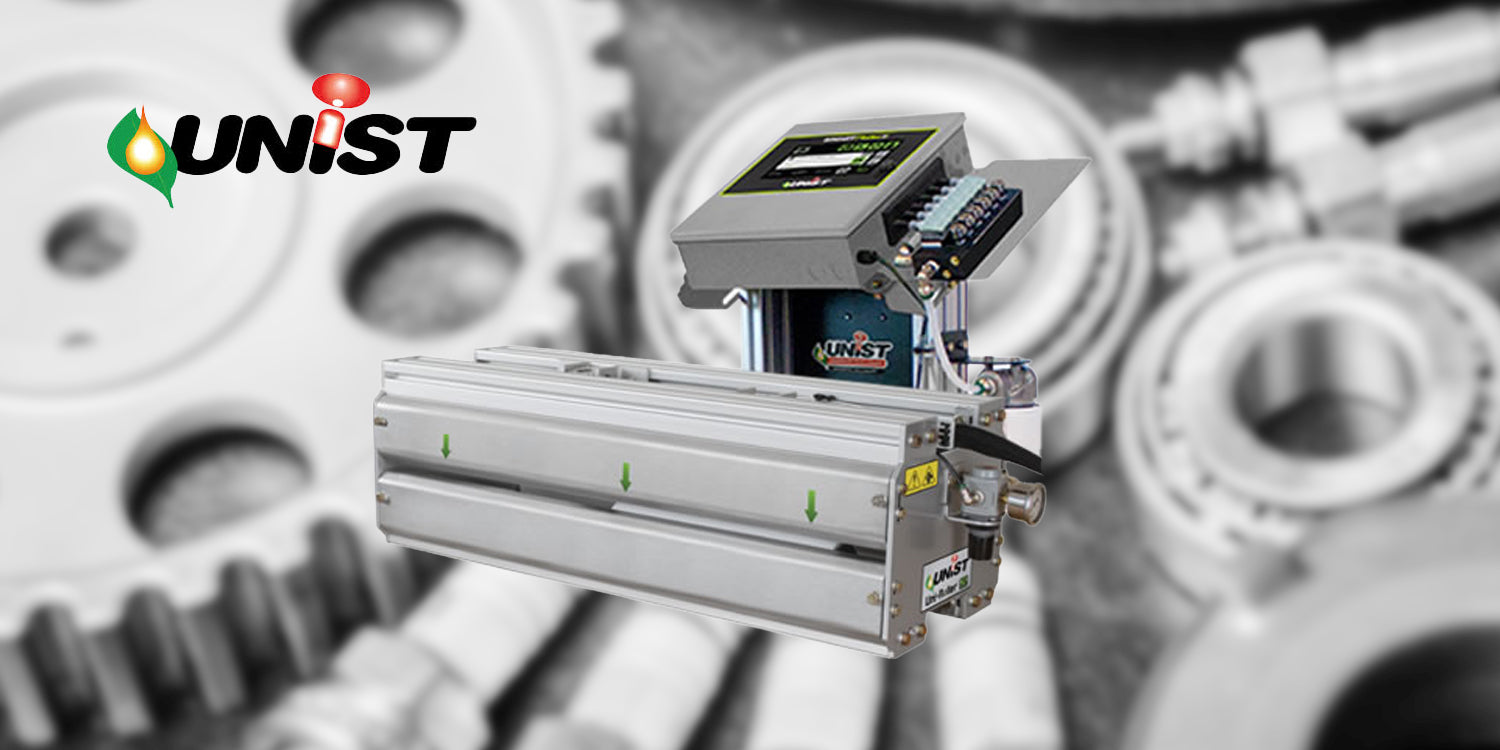When it comes to stamping high-strength steel (HSS) for automotive parts, precision is everything. As automakers push for lighter, stronger vehicles, the demand for advanced materials like HSS and ultra-high-strength steel (UHSS) has skyrocketed. These materials are ideal for crash-resistant structural components, but they come with a unique set of challenges—namely, increased friction, galling, and accelerated tool wear during the stamping process.
That’s where Unist’s lubrication systems come into play. By delivering precise amounts of lubricant exactly where it’s needed, Unist’s Minimum Quantity Lubrication (MQL) technology helps manufacturers reduce galling, extend tool life, and improve part quality—all while slashing lubricant consumption.
In this blog, we’ll explore how precision lubrication can transform your stamping operations and why Unist systems are the go-to solution for tackling the challenges of high-strength steel.
The Challenges of Stamping High-Strength Steel
High-strength steel offers exceptional strength-to-weight ratios, but its properties also make it more difficult to work with compared to traditional materials. Here are some common challenges manufacturers face when stamping HSS:
- Increased Friction: The higher tensile strength of HSS creates more friction between the material and the die surface during forming.
- Galling and Scoring: Without proper lubrication, material can adhere to the die surface, causing galling that leads to surface defects on parts and damage to tooling.
- Accelerated Tool Wear: The harder material increases wear on dies, punches, and other tooling components, leading to frequent maintenance or replacement.
- Lubricant Waste: Traditional flood lubrication systems often overapply lubricant, leading to waste, mess, and higher disposal costs.
These issues not only increase production costs but also compromise part quality and consistency—something no automotive parts manufacturer can afford in today’s competitive market.
How Unist Precision Lubrication Systems Solve These Challenges
Unist’s advanced lubrication systems are designed to address these pain points head-on by delivering lubricant with pinpoint accuracy and minimal waste. Here’s how:
1. Targeted Application Reduces Friction
Unist’s Uni-Roller® S2 system applies a consistent film of lubricant to both sides of the coil stock before it enters the press. This ensures even coverage across the material surface, significantly reducing friction during forming operations. Unlike traditional flood systems that saturate the material, Unist’s system uses just enough lubricant to get the job done—no more, no less.
2. Preventing Galling with Precision Control
By applying lubricant exactly where it’s needed—on high-friction areas like bends or deep-draw sections—Unist systems prevent material from adhering to die surfaces. This targeted approach minimizes galling and ensures a smooth finish on stamped parts.
3. Extending Tool Life
Lubrication plays a critical role in protecting tooling from wear and tear caused by high-strength materials. With Unist’s MQL technology, you can extend tool life by up to 40%, reducing downtime for maintenance and lowering tooling replacement costs over time.
4. Cutting Lubricant Consumption by Up to 90%
Unist’s MQL systems are engineered for efficiency. Instead of flooding your press with excess lubricant, they deliver a precise amount directly to the material or tooling surface via roller applicators or spray nozzles. This reduces lubricant consumption by as much as 90%, saving you money and minimizing waste disposal requirements.
The Uni-Roller® S2: A Game-Changer for Stamping Operations
One of Unist’s flagship solutions for stamping applications is the Uni-Roller® S2 system. Here’s why it stands out:
- Dual-Sided Lubrication: Applies lubricant evenly to both sides of coil stock in one pass.
- Adjustable Fluid Control: Allows operators to fine-tune application rates based on material type and thickness.
- Durable Design: Built to withstand the rigors of high-volume production environments.
- Easy Integration: Compatible with existing press lines and simple to install without major modifications.
For manufacturers working with HSS or UHSS materials, the Uni-Roller® S2 ensures consistent lubrication that enhances part quality while reducing operational costs.
Why Choose Unist for Your Stamping Needs?
Unist has been a leader in precision lubrication technology for decades, offering innovative solutions tailored to the unique needs of automotive manufacturers. Their systems are designed not only to improve operational efficiency but also to align with sustainability goals by reducing waste and energy consumption.
With Unist equipment in your stamping line, you’ll benefit from:
- Enhanced part quality
- Lower production costs
- Reduced environmental impact
- Increased competitiveness in the automotive supply chain
Conclusion: Take Your Stamping Operations to the Next Level
Stamping high-strength steel doesn’t have to mean higher costs or lower efficiency. With Unist’s precision lubrication systems like the Uni-Roller® S2, you can overcome the challenges of HSS stamping while improving part quality and reducing operational expenses.
At HMFT, we specialize in providing cutting-edge fluid handling solutions like Unist lubrication systems to automotive parts manufacturers across Canada. Let us help you find the right system for your specific needs.
Ready to transform your stamping operations? Contact us today to learn more about how Unist can make a difference on your production line!
FAQ
What types of materials can benefit from Unist lubrication systems?
- Unist systems are ideal for high-strength steels (HSS), ultra-high-strength steels (UHSS), aluminum alloys, and other challenging materials used in automotive manufacturing.
How much lubricant can I save with an MQL system?
- Manufacturers typically see up to a 90% reduction in lubricant usage compared to traditional flood systems.
Can I retrofit a Unist system onto my existing press line?
- Yes! Unist lubrication systems are designed for easy integration with most press lines without requiring significant modifications.
Does precision lubrication work with automated production lines?
- Absolutely! Unist systems are automation-ready and can be seamlessly integrated into robotic or fully automated workflows.
How does precision lubrication improve part quality?
- By ensuring consistent application of lubricant across the material surface, precision lubrication prevents defects like galling or scoring while maintaining tight tolerances.

